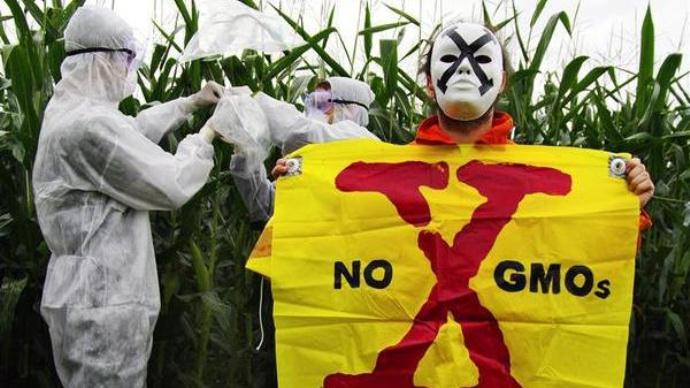
Last November, Monsanto lobbied against a California initiative that would have required all food products containing genetically modified organisms (GMOs) be labeled as such. The agricultural giant was successful in convincing California voters to vote against the initiative.
Instead of waiting for individual states to propose similar legislation, Monsanto appears to be playing offense and going after GMO labeling legislation in all states.
As reported by Ronnie Cummins, founder and director of the Organic Consumers Association (OCA), sources in Washington, D.C. have informed the group that Monsanto has begun secretly lobbying Congress to include amendments or “Monsanto Riders” to the 2013 Farm Bill that would prohibit states from requiring labels on any genetically engineered (GE) foods.
GE crops can include corn, soybeans, cotton, canola, sugar beets, alfalfa, papaya and squash, and comprise 41 percent of all cultivated cropland in the U.S. Approximately 170 million acres of GE crops are planted in the U.S., even though there is evidence that GE crops have a negative effect on human health and the environment.
The Monsanto-approved amendment was proposed by Rep. Steve King (R-Iowa), reportedly in response to a new California law that — starting in 2015 — will require any eggs sold in the state come from hens housed in state-approved cages.
Policy analysts say that the broad language in the amendment would allow Monsanto to argue that states are not allowed to require GMO labeling.
Currently there are initiatives in several states to label GMOs, including Washington, Vermont, Maine and Connecticut — and all are likely to pass.
But since 73 U.S. Senators voted in June 2012 against the states right to pass laws requiring foods containing GE ingredients be labeled, this latest pro-Monsanto amendment also has a chance to pass — even though 90 percent of U.S. consumers want mandatory labels and proper safety testing of GE crops and foods.
Since becoming aware of the amendment in the 2013 Farm Bill, health groups such as the OCA have warned incumbent members of Congress that a vote in favor of the amendment is disrespectful to food safety laws and the consumers right to know, and will result in efforts to oust that politician from office.
Groups like the OCA say that if the legislation passes, constituents in the 11 states that have constitutional provisions to recall U.S. Senators and Representatives who voted in favor of the amendment. In the states and counties without recall power, OCA says voters will show their disapproval on election night.
GMO labels: a slippery slope?
Opponents of labeling GMO foods have spent about 20 years lobbying the federal government to not pass any national law requiring labels on GE foods. But since the topic has been taken on by states, the groups have made it their mission to have the federal government pass a law prohibiting states from passing a law requiring states to label GMO products.
In the last year, Monsanto and other opponents to GMO labeling have spent millions lobbying politicians in 30 states to prevent and delay labeling legislation. In California alone, groups spent $46 million working to defeat the legislation.
Monsanto has also threatened to file federal lawsuits against Vermont, Connecticut, Maine and Washington.
Part of the fear for groups like Monsanto is that if a labeling initiative passes in one state, companies that have GMOs in their food — like Kellogg’s, General Mills, Coca-Cola, Pepsi/Frito-Lay, Dean Foods, Con-Agra, Safeway, Wal-Mart and Smuckers — will change their labels in all 50 states, not just the states where the legislation passed.
On its website, Monsanto says the company supports food companies’ choices to voluntarily label any food products so customers know what kinds of ingredients are in each item. However the company also makes it clear it is opposed to mandates that require its own food products be labeled, saying that “mandatory labeling could imply that food products containing [genetically modified] ingredients are somehow inferior to their conventional or organic counterparts.”
According to the Grocery Manufacturers Association (GMA), at least 70 percent of non-organic processed food at the grocery store contains GMOs, and GE grains are a staple ingredient in animal feed at factory farms that supply between 90 and 95 percent of the meat, eggs and dairy products that Americans consume.
Monsanto’s friends in Washington
This is not the first time Monsanto has tried to sneak legislation into other bills. Earlier this year, the company tried to include the “Monsanto Protection Act” — an act that would have given the company immunity from federal prosecution for planting illegally approved GE crops — into the 2013 Federal Appropriations Bill.
Having friends in Washington, D.C. has been an asset for the agricultural giant — the company has been allowed to continue the sale of some of its most dangerous products, in spite of some scientists advising otherwise.
A new study found that Monsanto’s top-selling herbicide Roundup is a deadly poison that destroys important bacteria in human stomachs, and is likely connected to a rapid increase in food allergies and human diseases such as cancer, neurological disorders, Attention Deficit Hyperactive Disorder (ADHD), dementia, Alzheimer’s, schizophrenia and bipolar disorder.
Farmers responsible for a large portion of the country’s food supply have reported that they have had to increase the amount of chemicals used on crops since many weeds have become resistant to herbicides like Roundup. The U.S. Environmental Protection Agency recently raised the amount of Roundup residue allowed on grain and vegetables, but scientists say the new levels are dangerously high.


